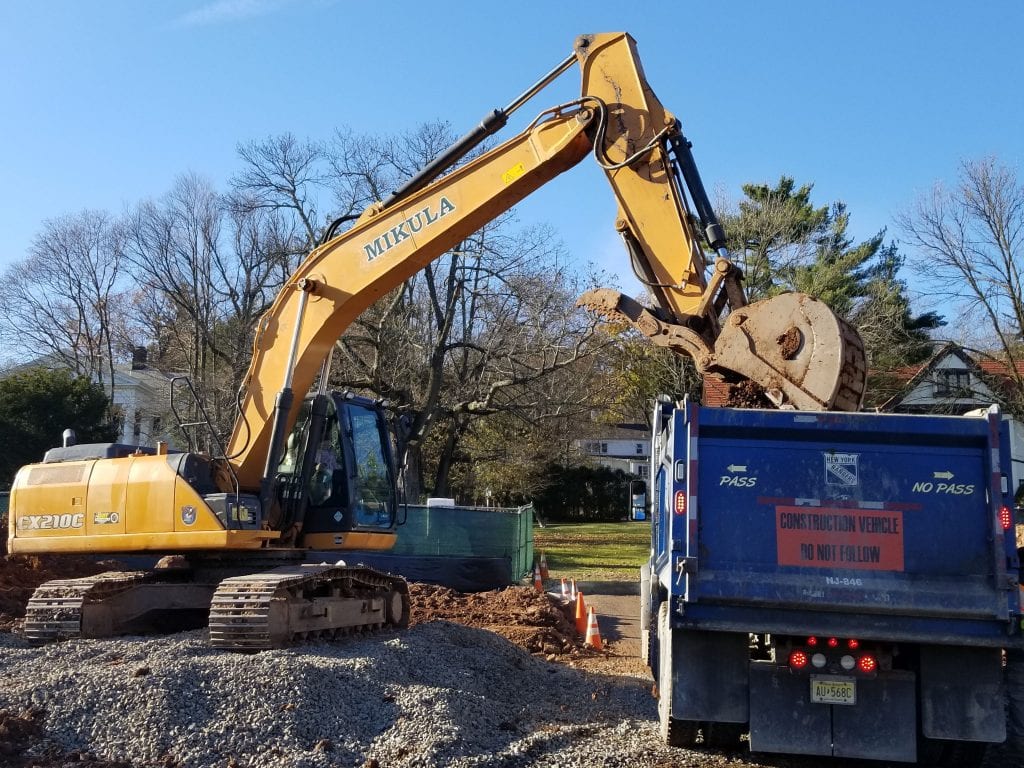Facts About Grading Contractors Revealed
Wiki Article
3 Simple Techniques For Concrete Contractors
Table of Contents3 Simple Techniques For DemolitionThe 6-Minute Rule for Excavation Contractors Near MeAbout Excavating Contractors9 Simple Techniques For Mini ExcavatorExcitement About General Contractor


Scrapers or Pans excavate soil in one area, haul and also dispose the dirt in an additional spot (grading contractors). It is difficult to match the efficiency of scrapers for cut/fill soil operation if the haul range is less then a mile. Scrapes are typically pulled by a rubber tire wheel tractor and are occasionally pressed via the cut location by a bulldozer.
There are lot of times that scrapes are not made use of for site grading and a dump truck is utilized: the haul may be to long, the haul might cross roads where scrapers are not permitted, difficult rock might be run into, equipment schedule, and so on. Dispose vehicles remain in typical usage and possibly call for little discussion.
"Rock body" beds, on the other hand, have no tailgates and can dispose any size rock, although their quantity capacity is decreased. Compaction Equipment enhances the density of the dirt and in some situations supplies a smooth, rolled surface.
What Does Excavation Contractors Near Me Do?
From a simple test pit to percussion drilling to core drilling the owner has progressively a lot more costly choices that generate significantly far better data regarding the site underground. For instance, the Owner on a 100,000 SF structure project may license twenty monotonous locations with split spoon soil examples taken till rock is gotten to and afterwards core samples of rock.Understanding the type and also top quality of rock (from the core examples) as well as area of rock (from the soils boring) is a real advantage in jobsite preparation. On the other hand, the Owner of a 100,000 SF structure may choose to wage no geotechnical screening whatsoever. The choice about geotechnical screening is usually made by a Proprietor without input from the Construction Manager.
The area on Soils and also Geology aids you recognize the terms in the geotechnical report. A knowledge of the approximate area of the rock helps the Construction Supervisor to plan the sequence of actions following rock excavation. If rock is in one edge of a large structure project, for instance, the earth excavation can start at the contrary end of the building in order to start structure work soonest.
Beginning the foundation job early would be a good concept if the rock can be removed by ripping. Nevertheless, if the rock is extremely difficult as well as needs significant blasting, it might be prudent to hold foundation job till the blasting is completed. The Construction Supervisor must work with these sorts of decisions as well as utilize all the technological day readily available.
Excavation Contractors Near Me Fundamentals Explained
Unclassified excavation specifies that all rock or various other unexpected materials (excluding dangerous products) experienced in the sitework will certainly be the responsibility of the Service provider at no modification in agreement cost. An unidentified excavation is easier from a book-keeping perspective and also puts the responsibility for geotechnical problems onto the Sitework Contractor.Just How Water Influences Sitework? It's remarkable what a hefty rain can do to a building and construction project. Prior to the rainfall, the website may be dry, hefty tools efficiently moving earth, the other professions efficiently executing their work. Within hours the job can be a sloppy, mud-hole with employee efficiency reduced to regarding 10%.
In most locations of the globe, the Building Supervisor need to bear in mind a simple fact: IT WILL RAIN. Good planning can minimize the damage and also disturbance of a heavy rainfall to a jobsite. Typically the excavation and grading is delegated the Sitework Specialist (as well as their Foremen is accountable to supervise and direct the hefty tools and also drivers).
The Building Supervisor should be continuously mindful of what rainfall will do to the task website. It is not uncommon for the Sitework Supervisor to function their heavy equipment for optimal effectiveness as well as wish it doesn't rainfall. One of the best means to plan for rain is to incline all grades what is excavation to drain pipes and to smooth rolled the surface area before a rain.
10 Easy Facts About Grading Contractors Shown
The Construction Supervisor should be well-balanced sufficient to insure that heavy rain does not stop work on the project much longer than necessary. Daily discussions with Sitework Foremen may be needed to achieve this goal. Whenever useful source excavation is called for below the existing groundwater level on a project, the process of dewatering need to be taken into consideration.In a truly cohesive soil, the water travels so slowly via the clay or silt that dewatering is not typically required for the relatively short time of excavation. Dewatering might be needed for a solitary ground excavation or for an entire project site. The most usual dewatering approaches are trench drains, deep wells and well points.

Ground water infiltration can likewise be decreased by cutoff methods such as sheet loading. The expenses for dewatering can be shocking, consisting of devices rental, labor and electrical power (or gas). High dewatering expenses have paled the profit margins on far as well numerous tasks. The many variables detailed below make the task of estimating dewatering prices extremely tough, as well as extremely inexact.
This choice needs to always be taken into consideration when examining the prospect of dewatering. Certainly the alternative is only feasible if gravity can run the water to lower ground. Trench drains can be reduced with a backhoe as well as loaded with a crude, granular material (# 4 rock for instance), but care needs to be worked out in choosing the water outlet kind and also area.
my blog
Indicators on Mini Excavator You Should Know
A siphon, necessarily, utilizes atmospheric stress to carry water from one altitude, up over an obstacle, to a reduced elevation. The pipelines in a siphon system need to be closed and also some resourcefulness is commonly needed to entirely load the siphon pipeline. The siphon pipe need to be complete for the siphon to start.A deep well consists of a pump, hose pipe and also a vertical well casing. The pump consumption is at the bottom of the well case (typically some smashed stone is put there as a filter medium) (excavating contractors). The water is inflated the hose, out of the well case, and to an appropriate discharge area.
In a coarse sand, for instance, a huge area can be pumped to near the pump intake altitude. A less permeable soil, on the various other hand, minimizes the performance of a deep well. Considering that the pump is generally at the end of the deep well, there are no elevation constraints due to vacuum lift, as well as deep wells can decrease the groundwater over 50 feet.
Under of the wellpoint there is a 2 foot long screen and valve, water jets out of this shutoff and also creates a hole into which the wellpoint pipe can be decreased. This hole is frequently made a larger size (for example 10 inches) to enable a rugged sand backfill to assist filter the water (trencher).
Report this wiki page